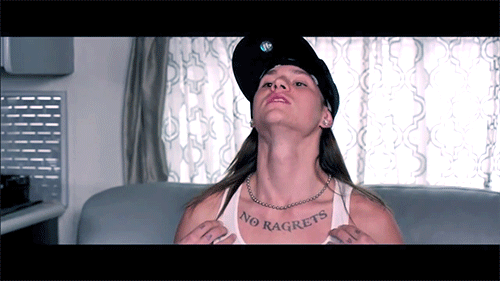 Thank you, Valerie, for alerting me to this! Yes, I use GIFs, so sue me kiddies.
Thank you, Valerie, for alerting me to this! Yes, I use GIFs, so sue me kiddies.Maybe all one can do is hope to end up with the right regrets.
Arthur Miller (born on this date in 1915), playwright of The Crucible and ex-husband of Marilyn Monroe
That's my experience of getting old in a nutshell. I have very few Regrets. I really am sad and/or sorry about the many times I've failed to be as good a person as I can be, but Regrets are sleep-robbers...there are very few in my life. And, I realized while having a delightful and rejuvenating family visit this past weekend, I only Regret the no-right-answer, no-win things where I had to make a choice. Without a good one, there's only the one that leaves "the right regrets."
If anyone on Earth knew what that meant, it was Arthur Miller. The Crucible's entire existence is about regret...in the moment decisions are made, regrets are born. When the stakes are as high as a human life, the regrets are so much more...pervasive, comprehensive, consequential. The Crucible's fury and rage, its powerfully presented condemnation of Puritanism and mob psychology going unchecked by leadership from a moral stance, express regret with a purity seldom achievable unless the author is consumed by regret.
Miller's play was written and performed after Miller had an affair with Marilyn Monroe in 1951. It was one that didn't end, exactly, and led him to divorce his decade-plus marital partner, and the mother of his children. Not unusual stuff. Monroe was pretty and talented and exciting, his children's mother was familiar and quotidian and doubtless, by then, slightly boring to him. Happens every day in every configuration of relationship.
It's undoubted that The Crucible was created in response to Miller's rage and righteous anger at Elia Kazan's HUAC testimony. His regrets about that broken comradeship, about the awful carnage it wrought on friends of his through the dragging of bait to their doors in order to distract the packs of ravening Puritan dogs (I apologize to Canis domesticus for impugning their species-level honor with my use of this established metaphor) from Kazan's own, were undoubtedly so intense that Reverend (!) Parris and Tituba's little pas-de-deux re: whipping fairly streamed molten from his fingers. Nowhere was there a choice, a turning point, where any of them could've made the situation a win-win. There were, from the first lies and the first betrayals, no clean paths to resolution.
What I needed, as a reader and a person, was to find in Arthur Miller's indictment of moral certainty in The Crucible a preordained path to Regretland. What I needed was to be told, in the end, there's no life lived without regrets. They're central to one's identity. Caustic regrets, the softer, sneakier ones that hide in the "good" things of life—until their bitter acidic waft alerts one to the hole burned into one's soul—are, in the end, the same results via different tracks.
I can't decide if I think Miller thought he had, or had not, had the "right regrets." I can't decide that for myself! But I know this: When I take my few real, nasty, keep-me-awake Regrets out and smack 'em around, I feel...edified. Even the way I phrase my regrets tells me something important about which parts are poking me in the softnesses. (I don't think most adults have simple regrets, but I could be projecting...most of mine are as many-layered as a ten-inch hailstone.) I can and regularly do learn about myself, my failings and failures, from my Regrets. I make plans to avert, avoid, or accept as inevitable the situations that have bred the Regrets.
Growing up never ends, I guess. Long may it be so.
No comments:
Post a Comment
Note: Only a member of this blog may post a comment.